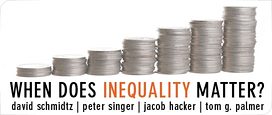I should probably be distressed about being unable to pen a vigorous dissent to David Schmidtz, but when he writes “Poverty Matters, But That’s Not Inequality,” I can only applaud. It’s what I’ve said myself in One World, discussing whether trade liberalization has been bad for the poor. Showing that the WTO trading system has widened the gap between rich and poor isn’t the issue. What really matters is whether the poor benefit from it. (The answer, as far as I can tell, is that a large number of the fairly poor have benefited, but the poorest 10 percent have not.)
Using this example makes me wonder why a discussion about when inequality matters soon turned into a debate about inequality in America. Since the greatest inequalities are not within America, but between the richest and poorest people globally, why aren’t we focusing on them? Why do so many discussions among American academics assume that only one country matters?
Again, I’m not saying that global inequality matters in itself. It’s global poverty that really matters. And here, the extreme degree of inequality becomes an opportunity, rather than a matter for concern. The rich are so rich, and the poor are so poor, that it is much easier for the rich to assist the poor to escape poverty than it would be, if the rich had less income. In The End of Poverty, Jeffrey Sachs roughly calculates that it would take an additional $124 billion a year in well-directed aid to bring the 1.1 billion people living under the World Bank’s poverty line above that line—the line at which they can meet their basic needs. Given that the income of the 22 wealthy nations that make up the OECD’s Development Assistance Committee is around $20 trillion, that’s a very modest extra contribution—only 60 cents in every $100 earned, and barely more than the US alone spends on alcoholic beverages each year.
Maybe Sachs is wrong—he admits that he’s left out distribution costs, and other factors – and we would need to spend twice or even three times that much. That would still be no more than the Iraq war has cost the US to date—in more than one year, granted, but unlike the costs of the war, the cost of fighting poverty global would be shared by 21 other nations.
Global economic equality is a fantasy not worth contemplating. But a world without widespread and severe poverty is a noble, and achievable, goal. At present, the U.S. gives shamefully little—either in public or private money—for the relief of serious poverty beyond its borders. I’d be more than happy to forget about economic equality if by doing so I could bring it about that everyone, liberals and conservatives alike, would work together to eliminate global poverty.

